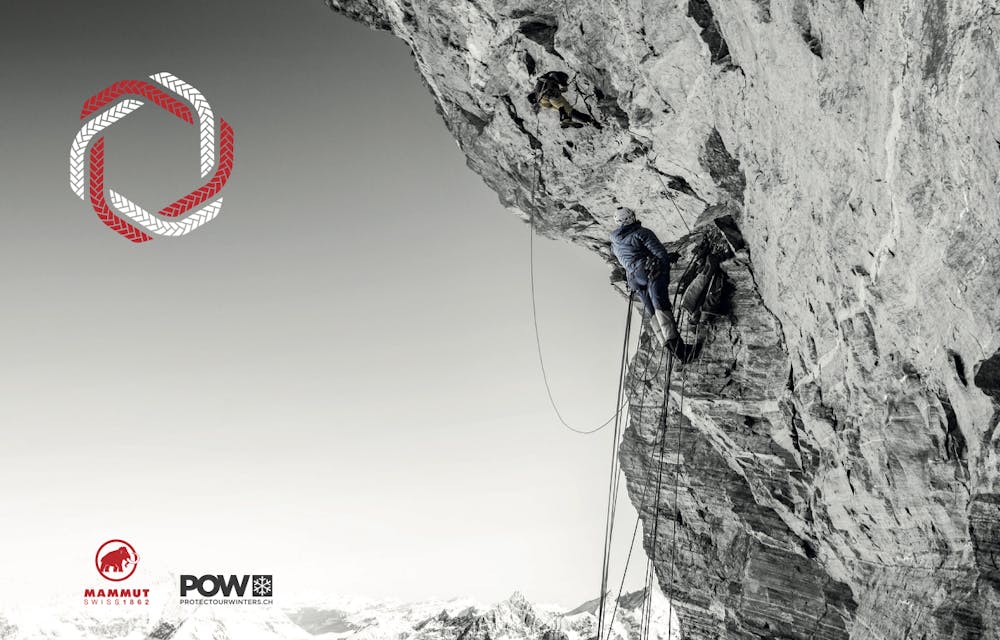
«Close the loop» - Pilot project in Switzerland improves CO2 footprint
The Project «Close the Loop»
MAMMUT and the climate NGO Protect Our Winters Switzerland (POW) successfully completed the joint pilot project «Close the Loop». Together they gave climbing ropes a new life. The result: 1’000 t-shirts made from ECONYL® regenerated nylon and a significantly smaller CO2 footprint during production.
MAMMUT aims to reduce the carbon footprint of their outdoor textile production process. As a signee of the UN Fashion Industry Charter for Climate Action, we are committed to a 30% reduction in CO2 emissions by 2030. By 2050, we want to produce carbon neutral. Proportionally, the production of climbing ropes causes the highest CO2 emissions, in 2018 it accounted for almost 14% of our CO2 footprint.
The Project «Close the Loop»
A climbing rope is used for about five years and then thrown away. With this in mind, the idea for the «Close the Loop» project was born: The goal was clear - to find out how the polyamide that makes up the ropes could be reused again and again.
On June 9, 2020, we began collecting used ropes. Climbers in Switzerland had the option to donate their used ropes at nine collection points including: climbing halls and MAMMUT stores, as well as the option to use a free shipping service. «Close the Loop» was extremely well received by the climbing community. What began as nine collection points at the start of the project, grew to a total of 50.
«Together with Mammut, we were able to show that concepts for a circular economy can also be implemented in the outdoor industry. This is urgently needed to strive for a net zero society» says Nicholas Bornstein, Head of POW Switzerland.

Giving climbing ropes a second life
In three months, we collected 748 kilograms of rope. They were then delivered to Aquafil, a company which produces man-made fibers and is specialized in sustainable production models. Through a chemical process, the nylon contained in waste such as the ropes is processed into ECONYL® recycled nylon. This has identical properties as nylon yarn made from fossil fuels.
MAMMUT designers developed a T-shirt made of 100 % regenerated ECONYL® nylon. During the whole production we were able to save 67 percent of CO2 emissions per T-Shirt, compared to the traditional production with raw materials from oil.
European production chain keeps CO2 emissions low
To minimize CO2 emissions during the production process, we put emphasis on establishing a European supply chain. Aquafil regenerates the ropes, together with other nylon waste, in Slovenia. Then, in Lithuania, the textile company Utenos Trikotažas, processes the ECONYL® regenerated nylon into a functional T-shirt. Thanks to its 3D structure, the material dries quickly and fits comfortably on the body. The route is completed in Switzerland using HeiQ Pure technology, which prevents the build-up of odor. Thanks to this technology, the consumer can wash the T-shirt less often and save water. You can now purchase one of the 1’000 T-shirts from the «Close the Loop» project! Not to mention, a part of the proceeds from the sale of the t-shirts will be donated to POW Switzerland.
Myclimate verifies the environmental impact of «Close the Loop»
The non-profit foundation myclimate conducted a comprehensive life cycle assessment to determine if and how CO2 emissions are reduced through the «Close the Loop» project. It evaluated the entire production process; from the collection point of the ropes in Switzerland, their shipment to the European warehouse, and finally to the hands of the end consumer. To obtain a holistic picture of the supply chain, the analysis included water and energy consumption, as well as land use.
Another significant goal of ours was to identify the most environmentally friendly recycling method. So, myclimate analyzed various recycling options for this purpose. The study was carried out according to current scientific standards and was checked by an independent third-party company.
Positive effect from the pilot project «Close the Loop»
The «Close the Loop» project is an important step on our path to become carbon neutral by 2050. We are now testing the viability of expanding this project, as well as others in the field of sustainable management. Based on data from 2018, we calculated the nylon consumption for the year 2030. If we are able to completely replace standard nylon with ECONYL® regenerated nylon, it is estimated that up to 6,800 tons of CO2 could be saved by 2030.
Donate your old climbing rope and join the loop
With the project «Close the Loop» we make sure climbing ropes do not reach a landfill and instead are recycled and brought into a circular economy. Did you know that if you dispose your old climbing rope it leads to 2.35 kg of CO2 emissions per kilogram of rope? Together we can save these emissions. You can still donate your old ropes at any of the collection points or send them via mail.
Thanks for the support
A big thank you to all who donated their climbing ropes and made the project «Close the Loop» a reality for MAMMUT & POW Switzerland. Last but not least, a special thanks to all our project partners - we could have not done it without you.